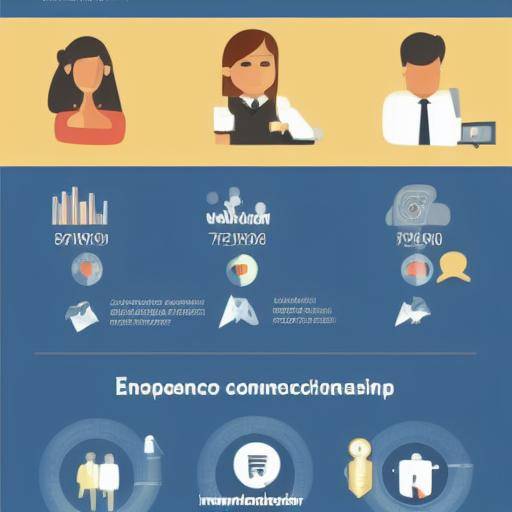
The Delphi method is a group decision-making technique that has proven to be effective in many contexts. From strategic planning to predicting trends, this collaborative approach allows teams to reach solid agreements based on collective knowledge. In this article, we will explore in depth how to use the Delphi method to make group decisions, analyze your applicability, advantages and challenges, and examine the future trends of this methodology.
Introduction:
Group decision-making is a fundamental part of organizational and business dynamics. Effective implementation of the Delphi method can enhance collaboration, creativity and informed decision-making. In this introductory section, we will explore the importance of this approach, its benefits and the purpose of this article.
History and Background of the Delphi method:
The Delphi method originated in the late 1940s as an approach to predicting and solving problems in complex environments. Developed by the Rand Corporation, its objective was to take advantage of the collective wisdom of experts to make informed decisions. Over the decades, the Delphi method has evolved and adapted to different contexts, becoming a valuable resource for group decision-making.
The technique has proved useful in areas as diverse as project management, urban planning, risk management and technological innovation. Its ability to synthesize diverse perspectives and generate consensus has made it an invaluable tool for strategic decision-making and anticipation of future scenarios.
Analysis in Depth of the Delphi method:
The Delphi method presents a number of significant advantages, including the elimination of group bias, the generation of creative ideas and conflict reduction. However, it also poses challenges in terms of coordination, managing expectations and maintaining the active participation of the members of the group. In this section, we will enter into a comprehensive analysis of the strengths and weaknesses of the Delphi method, backed by data, examples and expert testimonies.
Comprehensive Review of the Delphi Method:
The Delphi method has been successfully applied in many industries and disciplines. From public policy formulation to space exploration, this approach has demonstrated its versatility and adaptability. By exploring their applications and best practices, leaders and professionals can discover new ways to apply this method to improve decision-making in their respective areas. In addition, we will offer a critical view of the advantages and disadvantages of using the Delphi method in different contexts, providing a practical guide for its effective use.
Comparative Analysis of the Delphi Method, Group Decisions and Collaboration:
Although the Delphi method shares similarities with other collaborative approaches, such as group decision-making and open collaboration, it has distinctive attributes that differentiate it. In this section, we will perform a detailed comparative analysis to identify the strengths and limitations of each method, as well as the potential synergies that could arise by combining them. Specific examples will help illustrate the different applications and scenarios in which each approach stands out.
Practical Tips and Accessible Recommendations:
To make the most of the Delphi method in group decision-making, it is crucial to have clear and practical guidance for implementation. In this section, we will provide evidence-supported practical advice and case studies, which will enable readers to effectively apply this methodology in their own organizations. From initial configuration to results management, each key step will be approached in detail.
Perceptions of the Sector and Opinions of Experts:
The contribution of specializes perspectives and authorised opinions enriches the understanding of the Delphi method and its impact on group decision-making. Through interviews with opinion leaders and experts in various areas, we will explore the current and future implications of this methodology, as well as the trends and developments that will shape its evolution.
Case Studies and Practical Applications of the Delphi Method:
Real case studies offer an invaluable insight into how the Delphi method has been successfully implemented in different contexts. We will analyze a variety of practical applications that illustrate their usefulness and effectiveness in group decision-making. These cases will represent sectors such as health, technology, education and sustainability, providing concrete examples of how the Delphi method can boost significant results.
Trends Futures and Predictions of the Delphi method:
Finally, we will explore emerging trends and future predictions related to the Delphi method and its role in group decision-making. Based on current data and expert views, we will provide a prospective vision that will enable readers to anticipate changes and challenges, as well as identify opportunities to integrate this methodology in an innovative way into their decision-making practices.
Conclusion:
In short, the Delphi method represents a valuable resource for group decision-making, providing a collaborative approach that reduces bias and fosters creativity. As organizations seek more effective ways of making informed decisions, this method will continue to play a crucial role in a variety of contexts. This article has provided a thorough exploration of the Delphi method, its applications, challenges and future trends, inviting readers to consider how they could implement this methodology in their own group decision-making dynamics.
FAQs
1. What are the key benefits of the Delphi method in group decision-making?
The Delphi method offers several significant benefits, including the reduction of group bias, the generation of creative ideas and the facilitation of informed decision-making by taking advantage of the collective knowledge of the experts involved.
2. What are some of the challenges associated with the implementation of the Delphi method?
Although the Delphi method presents clear advantages, it faces challenges such as effective coordination of scattered groups, the maintenance of the participants' commitment and the management of expectations in complex environments.
3. What is the difference between Delphi and other group decision-making techniques?
The Delphi method is distinguished by its emphasis on generating consensus through successive rounds of exchange of views, allowing a wide variety of perspectives without the direct influence of group dynamics.
4. In which industries or contexts has the Delphi method been successfully applied?
The Delphi method has demonstrated its usefulness in a wide range of industries and disciplines, including urban planning, risk management, technological innovation and public policy formulation.
5. What are some best practices to successfully implement the Delphi method in group decision-making?
To effectively implement the Delphi method, it is crucial to establish a clear structure, promote active participation, ensure diversity of perspectives and effectively manage the process of feedback and synthesis of opinions.
6. What are future trends related to the Delphi method and group decision-making?
Future trends aim at greater integration of collaborative technologies, greater diversity in the participation of experts and adaptation to remote working environments, which will shape the future use and evolution of the Delphi method.
With this extensive exploration of the Delphi method, its application in group decision-making and its current and future relevance, readers will be equipped with solid knowledge to effectively understand and apply this methodology in their professional environments.















